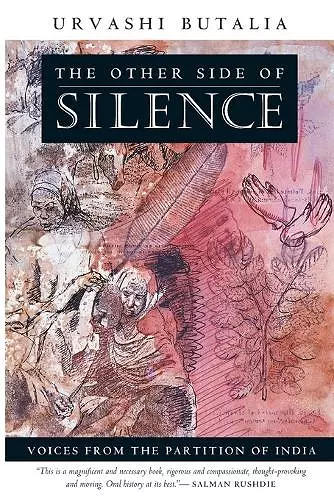The Other Side of Silence
Voices from the Partition of India
Format:Paperback
Publisher:Duke University Press
Should be back in stock very soon

The partition of India into two countries, India and Pakistan, caused one of the most massive human convulsions in history. Within the space of two months in 1947 more than twelve million people were displaced. A million died. More than seventy-five thousand women were abducted and raped. Countless children disappeared. Homes, villages, communities, families, and relationships were destroyed. Yet, more than half a century later, little is known of the human dimensions of this event. In The Other Side of Silence , Urvashi Butalia fills this gap by placing people-their individual experiences, their private pain-at the center of this epochal event.
Through interviews conducted over a ten-year period and an examination of diaries, letters, memoirs, and parliamentary documents, Butalia asks how people on the margins of history-children, women, ordinary people, the lower castes, the untouchables-have been affected by this upheaval. To understand how and why certain events become shrouded in silence, she traces facets of her own poignant and partition-scarred family history before investigating the stories of other people and their experiences of the effects of this violent disruption. Those whom she interviews reveal that, at least in private, the voices of partition have not been stilled and the bitterness remains. Throughout, Butalia reflects on difficult questions: what did community, caste, and gender have to do with the violence that accompanied partition? What was partition meant to achieve and what did it actually achieve? How, through unspeakable horrors, did the survivors go on? Believing that only by remembering and telling their stories can those affected begin the process of healing and forgetting, Butalia presents a sensitive and moving account of her quest to hear the painful truth behind the silence.
“The Other Side of Silence is without a doubt one of the most important books ever to be written about the Partition of the Indian subcontinent. More than a history, more than a memoir, it is also an extended reflection on narrative form. Official history has always flinched from acknowledging the full extent of the human cost of Partition. Urvashi Butalia shows us why we cannot afford to forget the suffering, the grief, the pain, and the bewilderment that resulted from the division of the subcontinent. [This] is an extraordinary achievement.”-Amitav Ghosh “Selective amnesia and memory are at the root of the relationship between human beings and their history. This book pierces that amnesia, elicits buried memories, and lays the foundations for a more evolved relationship between human beings on this subcontinent and their histories of gendered and communal violence.”-Kavita Punjabi, Telegraph (Calcutta) “This is a magnificent and necessary book, rigorous and compassionate, thought-provoking and moving. Oral history at its best.”-Salman Rushdie “[L]ays bare the passions of fear and hatred that too often drive the India-Pakistan relationship. . . . The raw horror of it all is mitigated by the author’s skillful prose, which draws the reader into the Indian story.” (Foreign Affairs) “Butalia has collected some fascinating material.” - Akash Kapur (New York Times Book Review) “Butalia is a pioneer in feminist publishing in India. She is especially alert to the presence-and absence-of marginal voices. . . . [T]he study of popular interpretations of violence as well as the persistence of memory makes this book a critical, self-reflective work. It may seem paradoxical, but the book’s freshness comes also from the fact that it examines wounds that have festered for more than fifty years.” - Amitava Kumar (The Nation) “Butalia’s book is remarkable for the author’s critical analysis of her own experiences as well as of the existing literature, and for her skillful demonstration of how the memory of Partition continues to affect India today.” (Publishers Weekly) “Butalia’s narratives shed light upon the role of religion in shaping identities of families and communitites.” - Chandra S. Mallampalli (Books & Culture) “Libraries collecting on genocide, migrations, and freedom struggles definitely need this work.” (Library Journal)
ISBN: 9780822324942
Dimensions: unknown
Weight: unknown
328 pages